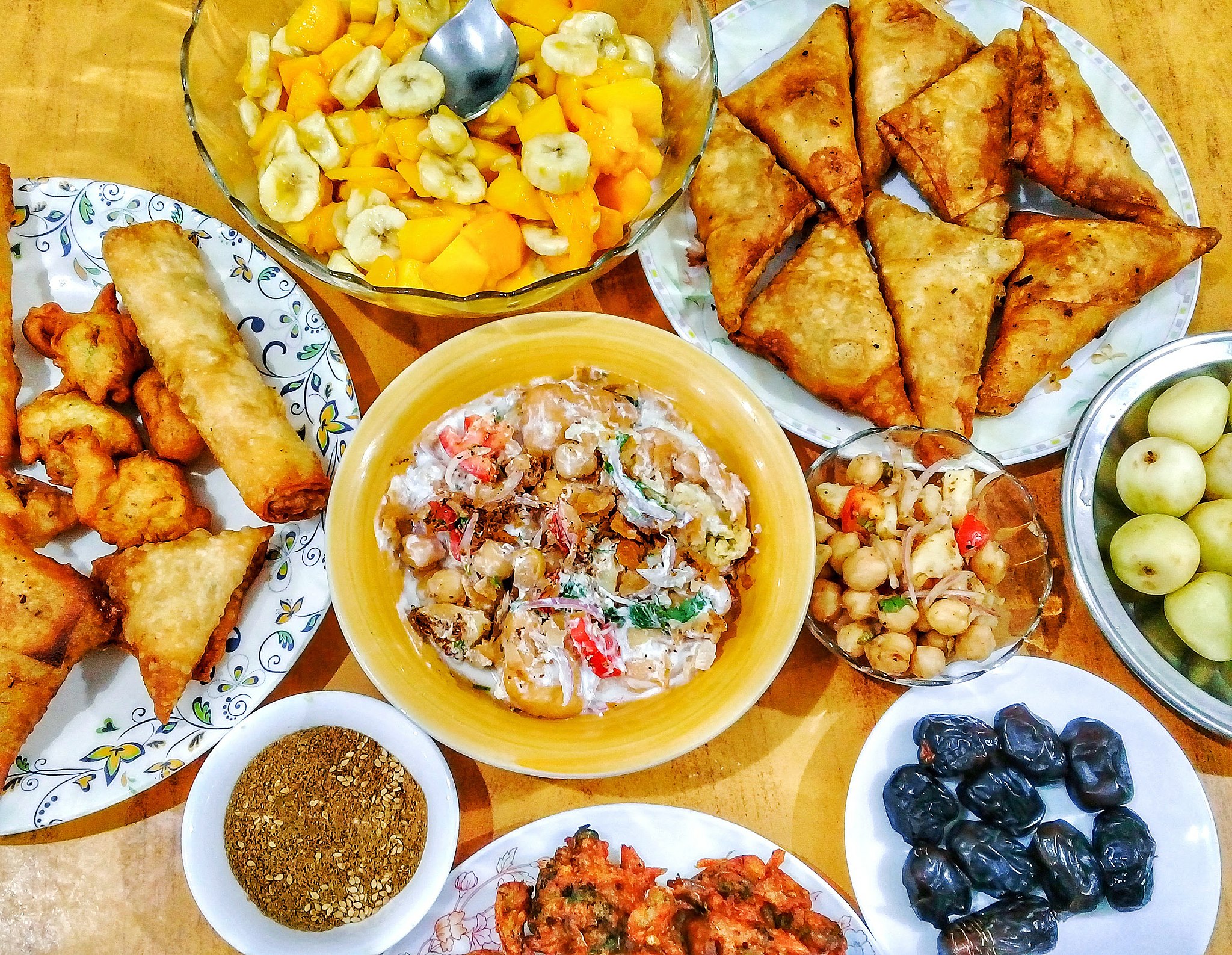
Struggling With Disordered Eating During Ramadan
 Alaina grew up with fond memories of Ramadan. She loved the satisfaction of having her favorite foods after a long day of fasting. But along with the samosas and jalebis she so enjoyed, the iftar table was accompanied by another constant: a conversation about how fattening these same foods were and how much weight everyone gained during the holiday. The conversation always seemed unnecessary to her. “I never liked diet talk or diet culture, but I always thought it was something I could easily remove myself from,” she said.
Alaina grew up with fond memories of Ramadan. She loved the satisfaction of having her favorite foods after a long day of fasting. But along with the samosas and jalebis she so enjoyed, the iftar table was accompanied by another constant: a conversation about how fattening these same foods were and how much weight everyone gained during the holiday. The conversation always seemed unnecessary to her. “I never liked diet talk or diet culture, but I always thought it was something I could easily remove myself from,” she said.
Despite her distaste for the constant diet talk surrounding her, Alaina, 22, said that she found herself becoming increasingly critical of the food she consumed. It wasn’t the quantities that changed initially, she said, adding, “It started off with me just constantly thinking about how many calories the food I was eating had and how bad it was for me.” For a while, she was able to keep these thoughts at bay. But during one Ramadan about six years ago , she felt something go wrong.
“I started monitoring my calories to the point where I would set goals of 800 or 900 calories for myself, and force myself to exercise every day or else I would eat even less. Everything was monitored on an app on my phone. I berated myself for eating even one samosa, allowing myself only a few bites at iftar because I felt like I didn’t deserve food if I didn’t work out.” Alaina says.
The compliments that she began to receive as she lost weight only motivated her to continue for the rest of the month. Hearing the same diet conversations in which everyone at the table complained about their food intake only made her feel more powerful about the control she continued to exercise. It was only at the end of Ramadan 6 years ago, when her mother caught on to what she was doing, because she noticed her low energy and rapidly decreasing weight that Alaina was able to end such behaviors.
Alaina’s story isn’t a one-off in the Muslim community. Ramadan can be a testing time for Muslims who struggle with eating disorders or disordered eating, which can often manifest in ways that can make it even harder for them to observe the monthly fasts. And lack of awareness about eating disorders in Muslim communities can make seeking help and recovery even more difficult for those who need it. According to Melissa Rizk, an eating disorder specialist in Beirut, there’s a misconception about eating disorders like anorexia being seen as a “rich white girl’s disease.”
“People of all socio-economic groups, genders and ethnicities can suffer, but the awareness is low,” she said. Perhaps more to the point, because of stereotypes that suggest eating disorders are seen as a Western issue, both awareness within Muslim communities and studies about the cultural impact of eating disorders in Black and Minority Ethnic (BAME) communities remains low. Debbie Watson, founder of Wednesday’s Child, an eating disorder support organization, says that she sees fewer people from Muslim communities coming forward. She says that this may be due to the way spaces for help and calls for awareness are communicated.
“I don’t think it’s because Muslim communities aren’t facing these issues. We have calls come in from Muslims who are struggling who ask us if having an eating disorder allows them to be exempt from fasting,” she says, adding that while anorexia is the most commonly assumed eating disorder, not all EDs are restrictive. “For those struggling with disorders such as bulimia or binge eating disorder, which are often triggered by large quantities of food, having to sit at an iftar table full of food, or the pressure to eat a lot in a small amount of time [between iftar and sehri], can be quite triggering” Watson says.
A major issue with awareness around eating disorders in Muslim communities comes from the taboos around mental illnesses. Watson says that in many cases, eating disorders impact the mind far more than they impact the body. Dietician Fareeha Jay, says that the stigma around mental health difficulties can lead to further trouble. “Mental disorders are seen as a weakness in that person’s faith. This can be extremely debilitating for people who are seeking support. Many times, Muslims with the disorder come to believe that their disorder is not legitimate, and they start feeling guilty and ashamed. Rather than getting empathy and support, they are condemned,” Jay said.
Jay says that one major step families and supporters of those struggling with eating disorders can take is to acknowledge that Ramadan is not defined simply by fasting. “It’s important to understand the reason for the month of Ramadan. Ramadan is much more than fasting; it is the month of Quran. If you are not fasting, focus on other things,” she said, adding that the responsibility goes beyond the home as well. “At present, [global] programs need to be run specially for Imams so that they can guide people in the right direction.
“By being aware, Imams can play their role by explaining to people that focus of Islam is wellness and health. Any type of worship where health becomes an issue, that worship has to stop,” she said.
Over the last few years — and increasingly so in the pandemic– young Muslim bloggers have led a conversation about eating disorders and Ramadan. . While this is crucial in terms of creating a sense of community, this work has also exposed just how little structural support there is for those in the community who are struggling.
Struggling with eating disorders can be a lifetime journey. Even when it comes to Ramadan, it’s not just the month alone that can be dangerous in terms of relapses. “Straight after Ramadan, people may be tempted to get back into excessive restriction, motivated by the fasting rituals and excessive conversations around food and control,” Debbie said. A major solution to this is targeting awareness in the right way, as a community effort. Eating disorders are as much mental as they are physical, and if we are to create a safer, more secure space for future generations, community efforts are key, as is a complete overhaul of a system that is so obsessed with food and bodies that for some, it manages to make the most spiritual month of the year about the number of inches you lose on your waist.
Anmol Irfan is a Muslim Pakistani journalist and a strong advocate for intersectional feminism. Her work explores identity, gender, and culture.
